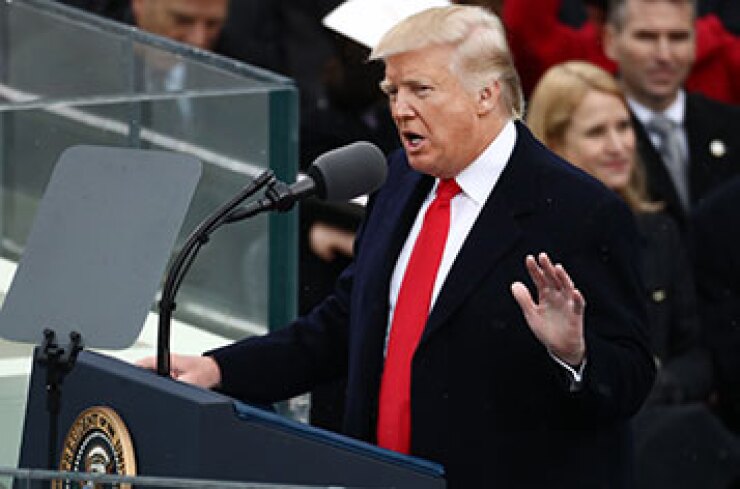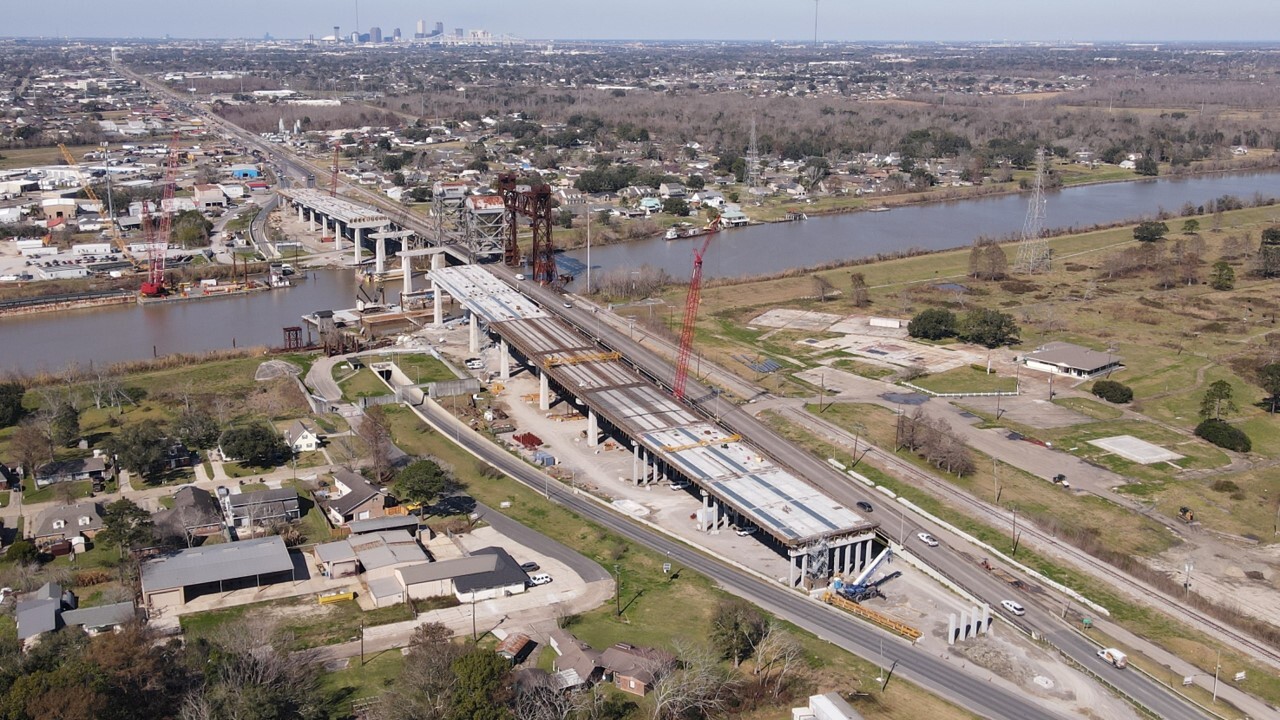
American infrastructure has fallen into "disrepair and decay," said President Donald Trump in his inaugural address Friday.
Airports, high-speed rail, and roads, particularly in dense metropolitan areas, could be particularly appealing targets for infrastructure funding under President Trump's $10-year, $1 trillion infrastructure plan.
The President's words on the campaign trail and tendencies as a public figure over decades informed those conclusions from stakeholders and infrastructure experts trying to gauge how Trump might be most interested in directing the 10-year, $1 trillion infrastructure plan he campaigned on. The campaign's only formal plan to date is a relatively brief paper proposing $137 billion of tax credits to be authorized by Congress and available only to investors in revenue-producing projects such as toll roads, toll bridges, and airports.
But while Trump's actual infrastructure plan remains light on specific areas of focus, he has left clues in his words and in his actions as a real-estate developer. Trump made very negative mention of the state of U.S. airports during the campaign, characterizing them during the Sept. 26 debate at Hofstra University in New York as "third world." Trump specifically mentioned several large airports, including LaGuardia Airport and John F. Kennedy International Airport in New York City, Newark Liberty International Airport in New Jersey, and Los Angeles International Airport as being inferior to facilities in the United Arab Emirates, Qatar, and China.
"We've become a third-world country," Trump said from the debate stage.
Kevin Burke, president and chief executive officer of airport industry group Airports Council International-North America, said his group believes that major U.S. airports need $75 billion of investment just through 2019.
"We have been happy during the campaign hearing the President-elect talk about infrastructure," said Burke, who believes that Trump recognizes that airports serve not just as transportation hubs but as important economic drivers for the regions where they are located.
"They really are centers of commerce," Burke said. "This is not only helping to build new airports, but it is helping the local economy."
Airports are also highly visible types of infrastructure many millions of people see while traveling through the U.S. Burke said that American hub airports handle about 800 million passengers annually, with that number estimated to grow to more than a billion in the next 20 years. A lot of the upcoming infrastructure investment will be aimed at adapting airports to modern needs, such as post 9/11 security, Burke said, as well as at other land-side infrastructure such as parking garages. Airports use tax exempt bonds for many of their infrastructure improvements, and rely on passenger facilities charges capped by federal law to generate much of their revenue. Trump could be influential as president both in maintaining the tax-exempt status of munis through any tax reform proposal and in supporting the uncapping of PFC charges to allow localities to set them at levels they feel appropriate.
Backers of bullet-trains, popular internationally but not so far in the states, also see hope under a Trump administration.
"We actually think high-speed rail is perfect for Trump," said U.S. High Speed Rail Association president and CEO Andy Kunz. "It's big, it's flashy, it's transformative."
The U.S. currently has no "true" high-speed rail service comparable to the bullet trains operating in some other countries. Amtrak's Acela service along the Northeast Corridor between Washington D.C. and Boston can reach speeds of up to 150 miles per hour, but realistically does not maintain those speeds for the majority of the route. The Japanese Shinkansen trains, by contrast, are capable of 200 miles per hour and have reached even greater speeds on occasion. Efforts to build new high-speed lines have met with resistance and financing troubles, as exemplified by an under-development line connecting cities in Northern and Southern California that has come in over the original cost estimates and been fought every inch of the way by some landowners potentially affected by its construction.
Kunz pointed out that Trump's campaign statements appealed heavily to blue-collar workers concerned about declining manufacturing opportunities that a widespread high-speed rail program could help with. Kunz said that his group sent Trump a letter shortly after his election victory urging him to be a leader on the issue and pointing to a specific project linking Los Angeles and Las Vegas as one that could benefit from Trump's backing right now. That project, XpressWest, has been in development for over a decade and would use electric trains traveling more than 150 miles per hour to cover the distance between the two cities in about 80 minutes.
Kunz said that Trump, as a longtime multi-billion dollar real estate developer, understands the value of train stations and could see the appeal of a project like the XpressWest that could be finished within Trump's first term if expedited.
"He could be showing up at a ribbon-cutting," Kunz said.
Toll roads are also a sector primed for investment under Trump because of the structure of his proposed plan, which emphasizes projects with a revenue stream. But toll roads, especially for heavily trafficked interstates, could face a lot of resistance that could discourage a strong push in that sector.
"Tolling the interstates is a total non-starter," said Chris Spear, president of American Trucking Associations. "It is toxic and we will fight it, tooth and nail. We need national connectivity and tolling is the worst type of approach."
"I can assure you he's going to get a lot of pushback from taxpayers who are tired of these crony-capitalism deals that guarantee huge profits to contractors and investors," said Terri Hall, founder and director of Texans for Toll-free Highways. "Voters trust Mr. Trump will read the tea leaves and advance a transportation vision and policy that's pro-freedom, pro-taxpayer, and pro-worker."
Cato Institute infrastructure expert Randal O'Toole said he didn't believe Trump's plan would significantly increase toll road investment, and that Trump's tax-credit plan doesn't change the fact that the states and localities still largely control what they want to invest in. Muni groups have urged Trump not to support eliminating or capping the tax exemption on muni bonds, preserving them as a cost-effective means of finance. Trump told the U.S. Conference of Mayors earlier this month that he plans to maintain the tax exemption.
"Trump may have a few ideas for selected projects, most of which I would probably disagree with, but the tax credit plan really leaves all decisions to state and local governments," O'Toole said. "Right now, those local governments can issue tax-free municipal bonds; the tax-credits idea just provides an alternative method of funding."





